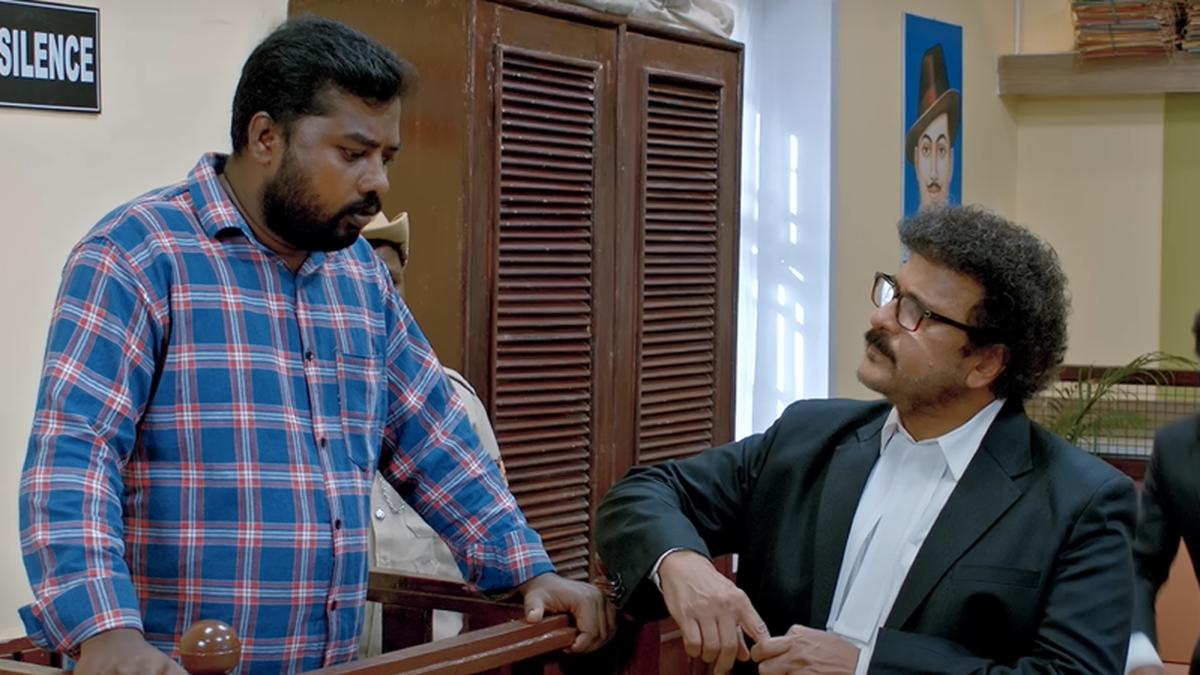
In the vividly complex world of courtroom intrigues and legal maneuvers, director Gururaj Kulkarni’s film, *The Judgement*, serves as a substantial offering. The narrative centers around Anil, portrayed by Diganth Manchale, an investment banker who finds himself ensnared in the legal system, accused of murdering Roopa, played by Roopa Rayappa, a prominent head of an NGO. Right from the onset, the film subtly signals to the audience that Anil may not be the true perpetrator, weaving an intricate tale of suspense and legal complexities.
The plot thickens as Govind, enacted by V. Ravichandran, steps into the scene. Acclaimed as the best lawyer, Govind’s initial portrayal is that of a man with a determined intent to prove Anil’s guilt. Despite his compelling courtroom strategies, the narrative nudges viewers to sense an underlying layer of mystery. This juxtaposition sets the stage for an exploration of the Indian legal system rather than a mere whodunit mystery. Consequently, as the drama unfolds, the audience often finds itself two steps ahead, predicting turns even as the filmmakers attempt to lace the proceedings with surprise elements.
As the courtroom drama escalates, a transformative arc in Govind’s storyline brings pivotal change. Govind undergoes a moral and professional awakening, deciding to re-evaluate Anil’s case in earnest to unearth the truth. This shift marks a turning point in the film, striking at the core of the lawyer’s motivations and raising profound questions about the forces driving legal professionals. Perhaps most engaging is the poignant observation about how some lawyers are swayed by their egos, choosing cases that stoke their pride. Govind, seeking the accolades of being perceived as unparalleled in his profession, is depicted as falling victim to this very human flaw. His wife, essayed by Meghana Gaonkar, challenges this notion, compelling Govind to question whether his pride could indeed obfuscate the truth.
The pace of *The Judgement* accelerates when Govind commits to delving into the details of the case, attempting to connect the dots between Roopa’s murder and other seemingly unrelated cases.
. This narrative expansion introduces viewers to various legal stipulations and courtroom possibilities, adding to the film’s depth despite occasionally overwhelming the audience with a deluge of legal jargon.
Despite its considerable effort to craft an engaging legal drama, *The Judgement* does betray certain limitations. At times, it veers into the territory of television serials, with a background score that tends to be more dissonant than supportive during pivotal scenes. The design of the courtroom additionally feels somewhat anachronistic, detracting from the otherwise contemporary narrative.
Anil’s parents, portrayed by Rangayana Raghu and Rekha Kudligi, present well-intentioned yet stereotypical portrayals of anguish and despair, reminiscent of soap opera characters. Qureshi, the corrupt minister, comes across with all the exaggerated traits of a clichéd villain. However, Krishna Hebbale’s competent performance manages to inject some authenticity into this role, salvaging it from the brink of caricature. Intermittently, the audience is treated to glimpses of junior lawyers commenting on Govind’s prowess, a narrative technique that, while perhaps intended to underline his skills, ultimately serves to dilute focus and impede narrative momentum.
A significant shortcoming of *The Judgement* lies in its failure to robustly flesh out the whodunit aspect of the plot. Crucial evidence emerges with convenient ease, making it relatively simple for viewers to piece together the identity of the real culprits early on. Despite this predictability, the courtroom sequences, facilitated expertly by Ravichandran’s performance, maintain the film’s watchability, though the heavy influx of legal minutiae can potentially exhaust the audience.
In summary, Gururaj Kulkarni’s sophomore film, for all its predictability, is far from a dismissible effort. While it may not fully capitalize on its potential to be a gripping mystery, it retains enough compelling elements to keep viewers engaged. Kulkarni’s attempt to spotlight the intricacies of the Indian legal system through a personal and moral lens offers thought-provoking insights, even if the journey sometimes feels more familiar than novel.
Reflecting on Kannada cinema’s broader landscape, *The Judgement* stands as a testament to the ambitious strides being made in the genre of legal dramas, solidifying its presence in Indian cinema.












